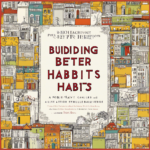Breaking bad habits can be challenging, but with a thoughtful and deliberate approach, it’s certainly achievable. Habits are automatic behaviors that our brains develop to streamline our routines and conserve mental energy. Over time, some habits can become detrimental to our health, productivity, or well-being, and breaking free from them becomes essential. So, how can we kick those undesirable habits to the curb?
First, it’s crucial to understand the habit loop, comprising three elements: the cue, the routine, and the reward. The cue is the trigger that initiates the habit. It could be a specific time of day, an emotional state, or a particular location. The routine is the behavior itself, and the reward is the benefit or gratification we gain from performing it. To break a habit, we must disrupt this loop.
Start by identifying the habit you want to break and understand its underlying cue and reward. For instance, if your habit is smoking when feeling stressed, the cue is stress, and the reward may be the perceived relaxation or comfort from smoking. Once identified, you can develop strategies to replace the unhealthy habit with a healthier alternative.
The key to success is not just willpower but creating an environment that supports your goal. This might involve avoiding triggers, at least initially, and replacing them with healthier alternatives. For example, instead of smoking when stressed, you could go for a walk or practice deep breathing to manage stress and still achieve the relaxation your body craves. It’s important to note that everyone’s habits and motivations are unique, so tailor your plan accordingly.
Additionally, building a support system can be invaluable. Share your goal with friends and family, and seek their encouragement and accountability. Consider joining support groups or online communities with others striving for similar changes. Surrounding yourself with people who understand your journey and can relate to the challenges can provide much-needed motivation and guidance.
Remember, breaking a habit takes time and persistence. Be patient with yourself and celebrate the small wins along the way. With consistency and a well-thought-out plan, you can rewire your brain and free yourself from the grip of unhealthy habits for good. So, take that first step today and embark on a journey toward a healthier and more positive you.
Another essential aspect of breaking bad habits is understanding why they formed in the first place. Habits often serve a purpose, whether it’s a way to cope with stress, boredom, or something else entirely. To break the habit effectively, it’s crucial to address the underlying cause. For example, if you tend to overeat when stressed, finding alternative stress management strategies, such as meditation or exercise, can help break the habit.
It’s also worth noting that breaking a habit doesn’t have to mean eliminating the behavior entirely. Sometimes, it’s about moderation and self-control. For example, instead of vowing never to eat sugary foods again, aim for a balanced diet where you allow yourself treats in moderation. This approach can make breaking habits more sustainable and prevent feelings of deprivation.
One powerful tool to aid in breaking bad habits is self-monitoring. Keep a journal or use an app to track your behavior, noting the triggers, frequency, and intensity of the habit. This awareness can help you identify patterns and gain insight into your behavior. It also provides a sense of accountability and helps you celebrate your successes and identify areas for improvement.
Positive reinforcement is another crucial technique. Reward yourself for small victories and milestones along the way. For example, if you’re trying to break a habit of procrastination, set small achievable goals, and reward yourself when you meet them. The rewards don’t have to be grandiose; they can be as simple as allowing yourself time for a favorite hobby or treating yourself to something small.
Finally, be mindful of your self-talk. How we speak to ourselves has a significant impact on our ability to break habits. Instead of chastising yourself for setbacks or past failures, offer words of encouragement and self-compassion. Remind yourself that change takes time and that each step, no matter how small, brings you closer to your goal.
In conclusion, breaking bad habits is a challenging but rewarding endeavor. By understanding the habit loop, creating a supportive environment, and seeking support, you can break free from unwanted behaviors. Remember to be patient, persistent, and kind to yourself throughout the process. Change is possible, and with the right tools and mindset, you can shape your habits to align with a healthier and more fulfilling life. So, embrace the journey and take that first courageous step toward transformation.










